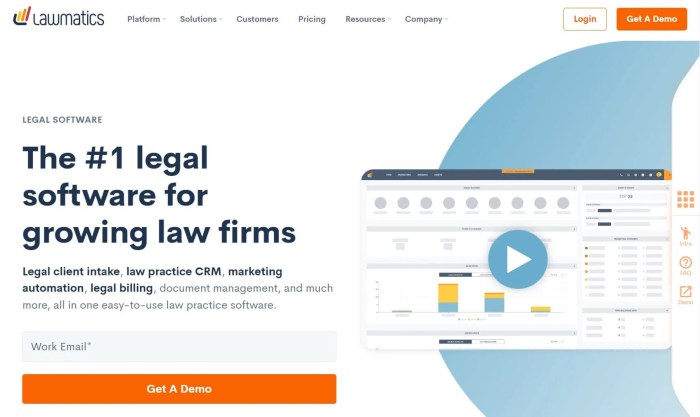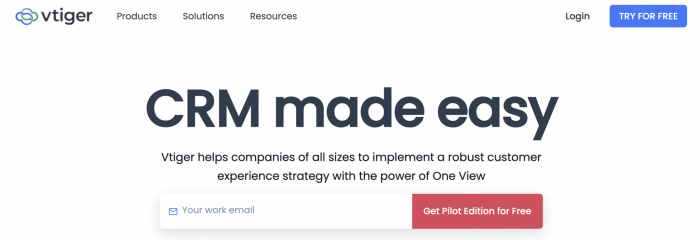Crm software for law firms – In today’s competitive legal landscape, efficient client management is paramount. Law firms, regardless of size, are increasingly relying on Customer Relationship Management (CRM) software to streamline operations, improve client communication, and ultimately, enhance profitability. This comprehensive guide delves into the world of CRM software specifically tailored for law firms, exploring its benefits, key features, implementation considerations, and frequently asked questions.
Why Law Firms Need CRM Software
The traditional methods of managing client interactions – spreadsheets, emails, and disparate databases – are often inefficient and prone to errors. A dedicated legal CRM system offers a centralized platform to manage all aspects of client relationships, leading to significant improvements in:
- Client Relationship Management: Track interactions, deadlines, and preferences for each client, ensuring personalized service and fostering stronger relationships.
- Case Management: Organize case details, documents, and communication history, facilitating efficient case handling and reducing the risk of missed deadlines.
- Improved Collaboration: Facilitate seamless collaboration among team members by providing a shared platform for accessing client information and case details.
- Enhanced Productivity: Automate repetitive tasks such as scheduling appointments, sending reminders, and generating reports, freeing up valuable time for lawyers to focus on legal work.
- Better Business Intelligence: Gain valuable insights into client behavior, case trends, and firm performance through comprehensive reporting and analytics.
- Increased Revenue Generation: By improving efficiency and client satisfaction, CRM systems contribute directly to increased revenue and profitability.
Key Features of Legal CRM Software
While general CRM systems offer many benefits, legal-specific CRMs incorporate features designed to meet the unique needs of law firms. These include:

Source: whsuites.com
Core Features:, Crm software for law firms
- Contact Management: Detailed client profiles with contact information, communication history, and case details.
- Matter Management: Centralized repository for all case-related documents, communication, and deadlines.
- Document Management: Secure storage and retrieval of legal documents, ensuring compliance with data privacy regulations.
- Calendar and Scheduling: Integrated calendar for managing appointments, deadlines, and court appearances.
- Task Management: Assign and track tasks, ensuring timely completion and preventing missed deadlines.
- Reporting and Analytics: Generate customized reports to track key performance indicators (KPIs) and gain insights into firm performance.
- Communication Tools: Integrated email, phone, and messaging features for seamless communication with clients and colleagues.
- Time Tracking and Billing: Accurate time tracking and billing capabilities to ensure efficient invoicing and revenue management. This often integrates with legal billing software.
Advanced Features:
- Client Portal: Secure online portal for clients to access case information, documents, and communicate with their lawyers.
- Integration with Other Legal Software: Seamless integration with other legal software such as practice management systems, e-discovery platforms, and document automation tools.
- Workflow Automation: Automate repetitive tasks such as document generation, email reminders, and case assignment.
- Conflict Checking: Automated conflict-of-interest checks to ensure compliance with ethical guidelines.
- Customizable Dashboards: Personalized dashboards providing a real-time overview of key metrics and information.
- Security and Compliance: Robust security measures to protect sensitive client data and ensure compliance with relevant regulations (e.g., GDPR, CCPA).
Choosing the Right CRM Software for Your Law Firm
Selecting the appropriate CRM software requires careful consideration of your firm’s specific needs and budget. Factors to consider include:
- Firm Size and Structure: The size of your firm will influence the features and scalability required.
- Budget: CRM software solutions range in price from affordable cloud-based options to enterprise-level systems with higher costs.
- Integration Capabilities: Ensure the CRM integrates seamlessly with existing legal software and other business tools.
- User-Friendliness: Choose a system that is intuitive and easy for your staff to use.
- Scalability: Select a solution that can grow with your firm.
- Security and Compliance: Prioritize systems that offer robust security features and comply with relevant data privacy regulations.
- Customer Support: Reliable customer support is essential for resolving issues and ensuring smooth operation.
Implementation and Training: Crm Software For Law Firms
Successful CRM implementation requires careful planning and execution. This includes:
- Data Migration: Transferring existing client and case data into the new system accurately and efficiently.
- User Training: Providing comprehensive training to staff on how to use the CRM software effectively.
- Ongoing Support: Ensuring ongoing support and maintenance to address any issues and optimize system performance.
Frequently Asked Questions (FAQ)
- Q: What is the cost of CRM software for law firms? A: Costs vary significantly depending on the features, scalability, and vendor. Cloud-based solutions generally offer more affordable monthly subscriptions, while on-premise solutions may involve higher upfront costs.
- Q: How long does it take to implement a legal CRM? A: Implementation time depends on the size of your firm, the complexity of the system, and the efficiency of the data migration process. It can range from a few weeks to several months.
- Q: Can a CRM improve client satisfaction? A: Yes, by providing personalized service, efficient communication, and easy access to information, a CRM can significantly enhance client satisfaction.
- Q: What are the security implications of using a CRM? A: Security is paramount. Choose a CRM provider with robust security measures to protect sensitive client data and ensure compliance with relevant regulations.
- Q: Can a CRM integrate with my existing accounting software? A: Many legal CRMs offer integration capabilities with various accounting and billing software packages. Check the vendor’s specifications to ensure compatibility.
- Q: What are some popular legal CRM software options? A: Several reputable providers offer legal-specific CRM solutions, including Clio, MyCase, PracticePanther, and CaseGlide. Researching reviews and comparing features is crucial before selecting a system.
Conclusion
Implementing a CRM system is a strategic investment that can significantly improve the efficiency, productivity, and profitability of your law firm. By streamlining operations, enhancing client communication, and providing valuable insights, a well-chosen and implemented CRM can be a game-changer for your practice. Take the time to research your options, carefully consider your needs, and choose a solution that empowers your firm to thrive.
References
Call to Action
Ready to transform your law firm’s client management? Contact us today for a free consultation to discuss your specific needs and explore the best CRM solution for your practice!
FAQ
What are the common features of CRM software for law firms?
Common features include contact management, case management, document storage, calendar and scheduling tools, task automation, billing and invoicing, reporting and analytics, and client communication tools (email, portal access).
How much does CRM software for law firms cost?

Source: contentmavericks.com
Pricing varies widely depending on the features, number of users, and vendor. Expect a range from affordable monthly subscriptions to more substantial enterprise-level solutions.
How can I choose the right CRM software for my firm?
Consider your firm’s size, budget, specific needs, and existing technology infrastructure. Research different vendors, read reviews, and request demos before making a decision.

Source: teamwave.com
Is CRM software secure for handling sensitive client data?
Reputable CRM providers prioritize data security with features like encryption, access controls, and compliance with relevant regulations (e.g., GDPR, HIPAA).
What is the learning curve for using CRM software?
The learning curve varies depending on the software’s complexity and user-friendliness. Many vendors offer training and support resources to help users get started.
